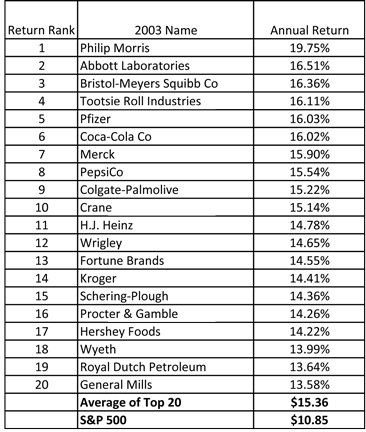 |
 |
|
When To Sell A StockNow that you've learned when to buy a stock, it naturally follows... ***z-affiliate-ad-1.shtml*** When should you sell a stock? Like any endeavor, you should always have an exit plan in mind from the very beginning. Unfortunately, 95% of investors never develop a plan. They buy and sell stocks based on rumor, feelings, or low-impact market information. But you wouldn't dream of doing that, would you? Remember, great companies are rare. Great investments are even more so. Because a great investment are so rare, you want to hold on for as long as possible once you find one. The best bet is to make a long-term commitment. Remember what Warren Buffett said? "You should invest like a Catholic marries - for life." Warren's basic message is that "forever" is the ideal holding period for a stock. But that's not always realistic is it? Even the best investments, like marriages, sometimes come to an end. So while the ideal goal is to purchase a stock and never sell it, there are legitimate reasons to sell a stock. When Should You Sell a Stock?Outside of personal financial reasons such as a dire need for immediate cash, you should only sell a properly purchased stock in the following two instances: 1) When, and only when, the business fundamentals which prompted you to invest in the first place have substantially and forever changed. 2) The stock is priced substantially above its intrinsic value (years ahead), and a better alternative investment exists. Keep in mind that both of these of these sell signals only apply to stocks purchased with the philosophy of buying great companies at great prices. (If the company you already own has always been lousy, then there's no need to read further... Go ahead and sell it!) A Great Business Becomes OrdinaryThe number one reason to sell a stock is if your previously great business somehow transforms itself into an ordinary business, or even worse, a mediocre business. How can this happen? Any number of ways... Unfortunately for business owners, it happens on a fairly regular basis. Need some examples? How about 20th Century media companies... Twenty years ago, companies like ABC Capital Cities (DIS) and The New York Times (NYT) ruled the world of media. The three major networks (ABC, CBS, and NBC) dominated the airwaves, and cable television only posed a marginal threat to the near monopoly power the big three wielded when it came to TV advertising. But today, major network viewership is in the midst of a long, protracted decline. Cable television has morphed into hundreds and hundreds of channels, further fragmenting the attention of the overall television audience. As a result, advertising revenue for the big three networks has declined in tandem with these developments, transforming these formerly great businesses into ordinary businesses at best. Meanwhile, the newspaper industry took an even bigger hit. Twenty years ago, major newspapers like The New York Times (NYT), The Washington Post (WPO), and The LA Times held their own near-monopolistic strangleholds on local and even national markets. If you wanted to advertise, post a classified listing, or read about local and international news, newspapers were pretty much the only game in town. Today, more and more people get their news from the Internet. They post their classified listings on the Internet, and the constant barrage of news updates they receive online, on radio, on TV, and elsewhere only serve to make the news in the newspaper seem old and stale by comparison. By the time a newspaper goes to print and gets distributed, it's old news. So printed newspapers are losing relevancy, market share, and revenues. Unless the newspaper industry adopts radical changes to its business model, a whole lot of once great businesses will forever be rendered mediocre... See now how the business fundamentals which originally prompted you to invest a stock can substantially change forever? Believe it or not, it happens all the time... So don't ever forget the importance of keeping yourself up-to-date and informed when it comes to the business prospects the great companies in your portfolio. Like a master gardener, you should stand alert, ready to prune away mediocre and ordinary businesses at a moment's notice. If you remain vigilant in weeding out the less than great, only great companies will be left standing... And since you bought those great companies at great prices, your investment returns will continue to be well above average! Your Stock Becomes Ridiculously OverpricedThe second best indicator of when you should sell a stock is when, and if, it becomes ridiculously overpriced. What constitutes ridiculously overpriced? I don't know... That's a decision you need to make on your own. But your stock's current price in relation to its intrinsic value provides a pretty good guideline... For instance, let's say you plug your stock's numbers into the Intrinsic Value Spreadsheet a couple of years after your original purchase. Since that time, your stock has dramatically increased in price... Let's say the stock's original Multiple was 5.41, but now it's 1.12. Moreover, it's already reached the Year 10 value projected by the spreadsheet. And it's only Year 2...! This is a stock that's gotten way ahead of itself... In such a scenario, it seems unlikely the stock will continue to outperform the market over the next ten years. If a better alternative investment exists, it's probably best to sell your overvalued stock and buy the better alternative investment. No One Ever Went Broke Taking a ProfitEver hear that one before? It's one of the most commonly quoted myths on Wall Street... "No one ever went broke taking a profit..." The insinuation is that it's never a bad idea to sell while you're ahead, because a profit is a profit! But as Peter Lynch notes in One Up On Wall Street, that's just a backward way of thinking: "There's no arbitrary limit to how high a stock can go, and if the story is still good, the earnings continue to improve, and the fundamentals haven't changed, "can't go much higher" is a terrible reason to snub a stock. Shame on all those experts who advise clients to sell automatically after they double their money. You'll never get a ten-bagger doing that."Okay, so your most recent investment increased 50%. You sell it and take your profit... Now what? What are you going to do with the proceeds? ...Invest in an average company? ...a mediocre company? ...Maybe some pork futures? Remember, sometimes the best stock to buy is the one you already own. Jeremy Siegel's Future For Investors vividly illustrates this concept by identifying a list of "Corporate El Dorados." Remember that list? Here it is... 
The companies listed above achieved these blockbuster returns year-after-year for over four decades. Along the way, I'll bet a lot of people sold these stocks and pocketed gains of 20%, 50%, 100%, and more... leaving a lot of money on the table. These investors fell prey to the notion that "no one ever went broke taking a profit." While technically true, a lot of people have lost a lot of money by not holding on to what they already had. Remember, sometimes the best investment available is the one you already have. Don't be quick to sell a great company because of external factors. If your company remains great and reasonably priced, hold on for dear life! What's that? Easier said than done...? Maybe so. But you need to understand the importance of holding on to a great investment through thick and thin. It can make all the difference between a lifetime of mediocre investment returns and market beating mega-returns. So how do you confidently hold onto your great company and its stock through years and years of volatility and turmoil? ...Through oil shocks and currency crises and market crashes? ...Through recessions and wars and depressions? By doing the one thing that ALL great investors do! Control your emotions. Sounds easy, doesn't it? Well, you'd be surprised how easy it is to engage in panic and/or euphoria, and that's why it's essential that you never engage in either one... Learn About Emotions And The Stock Market >>> ***z-affiliate-ad-2.shtml*** Return to the top of When To Sell A Stock Return to Trading Stocks In A Roth IRA Return to the Your Roth IRA Website Homepage
|
What's New?Read 5 Reasons Why I Love My Roth IRA, our part in the Good Financial Cents Roth IRA Movement! Start planning ahead for next year by checking out 2017 Roth IRA contribution limits, and stay alert to this year's changes to the 2016 Roth IRA contribution limits. Our family fully funds our Roth IRA with this website. Learn how you can do it too. Are you confused or frustrated by the stock market? Learn how to build real wealth selecting individual stocks for your Roth IRA... Read more about what's new on the Roth IRA blog. Hi, I'm Britt, and this is my wife, Jen. Welcome to our Roth IRA information website! This is our humble attempt to turn a passion for personal finance into the Web's #1 resource for Roth IRA information. But, believe it or not, this site is more than just a hobby. It's a real business that provides a stable and steady stream of income for our family. In fact, because of this site, Jen is able to be a full-time stay-at-home mom and spend more time with our daughter, Samantha. But you want to know the best part? ...You can do the same thing! Anyone with a hobby or a passion (even with no previous experience building a website) can create a profitable site that generates extra income. If you're tired of solely depending on your job(s) for family income, click here now and learn why our income is increasing despite the financial crisis and how we're making our dreams come true. |
|
Search This SiteRoth IRA BasicsMore About Roth IRAsRoth IRA ResourcesAbout Your Roth IRALike Us On FacebookFollow Us On Twitter
RSSDisclaimerThe information contained in Your Roth IRA is for general information purposes only and does not constitute professional financial advice. Please contact an independent financial professional when seeking advice regarding your specific financial situation. For more information, please consult our full Disclaimer Policy as well as our Privacy Policy. Thank YouOur family started this site as a labor of love in February 2009, a few months after our daughter was born. Thank you for helping it become one of the most visited Roth IRA information sites. Thank you, too, to the "SBI!" software that made it all possible. We hope you find what you're looking for and wish you much continued success in your retirement planning! |
||
|
| ||






